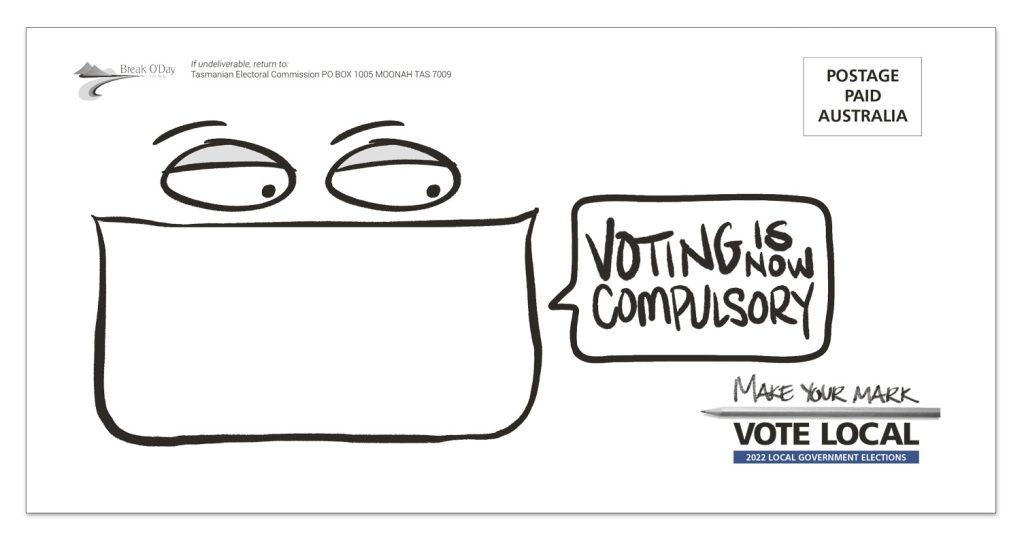Local government elections in Tasmania are conducted by post.
This means there is a ‘polling period’, rather than one polling day as for State parliamentary elections. Every elector receives their own postal ballot pack at their enrolled address. You then have around 3 weeks to complete and post your vote back to the returning officer for your council.
Ballot pack
During the polling period, keep an eye on your letterbox for your ballot pack, which will look similar to this.
Your ballot pack contains all the papers you need to vote in a local government election.
Below is an example of what a ballot pack will look like.

Voting
Recent amendments to the Local Government Act 1993 mean that voting in local government elections is now compulsory. Eligible voters need to ensure that they are properly enrolled to cast a vote in the elections. Voting is through a postal ballot.
- Almost everyone over 18, living, owning or leasing property in the Glenorchy City Municipality may be eligible to vote
- You can vote if you are on the State Electoral Roll and are a resident in the municipality (you do not have to own a property).
- You can vote if you own or manage property in the municipality but are not a resident, but you need to complete an enrolment form to be included on the General Manager’s Roll for owners/occupiers or corporate bodies.
Voting at local council elections in Tasmania is compulsory. Your vote will contribute to the outcomes in your local municipal area. To see that your local council performs to your expectations, you are encouraged to exercise your democratic right and vote.
For more information on enrolment, visit the Tasmanian Electoral Commission website.
Standing as a candidate
Whether you are a resident, property owner or business operator, becoming a Local Government councillor can be the most direct and rewarding way to contribute to your local community.
Councillors play a vital leadership role, working together to create and implement their community’s vision, strategic direction and the values within which they operate.
Mayors, deputy mayors and councillors are all elected for four year terms.
Standing for election provides you with a great opportunity to influence the future direction of the local community and help those who require support. It can be daunting and time consuming, but also rewarding. Councils are complex and vibrant organisations that require talented and dedicated individuals to participate in making the decisions that count.
The Tasmanian Electoral Commission’s Candidate Information Booklet provides more information about standing as a candidate in local government elections.
Eligibility
A person is eligible to nominate as a candidate for the office of councillor if they:
- are enrolled on an electoral roll in respect of the municipal area
- have their main residence in Tasmania
- are not a councillor of another council
- have not been barred by a court from nominating as a candidate at any election
- are not an employee of the council in that municipal area
- have not been removed from the office of councillor because of inadequacy or incompetency
- are not a bankrupt
- are not subject to an assessment order or treatment order
- are not in prison, or have been sentenced for a crime.
Mayors and deputy mayors must also be elected. You cannot be a candidate for both mayor and deputy mayor. You must successfully stand for and be elected as a councillor before you can accept the office of mayor or deputy mayor.
Electoral Signage Requirements
Election signs are subject to the provisions of C1.0 Signs Code of the Tasmanian Planning Scheme – Glenorchy. Council planning schemes outline any restrictions on the size of signs, the earliest signs can be displayed without a permit, and when they must come down. As planning schemes are currently variable between council areas, please check with your council as to what applies. More information about electoral signage requirements within the Glenorchy municipality is available here.
More information
- The Candidate Information Booklet helps with the legislative requirements and election processes.
- The Local Government Association of Tasmania (LGAT) has produced a presentation and handbook for candidates, Becoming a Councillor, which focuses on what councillors do (functions), campaigning and other relevant information. Further information may be found on the LGAT website.
- The rules for elections are set out under Part 15 of the Local Government Act 1993 (the Act).
